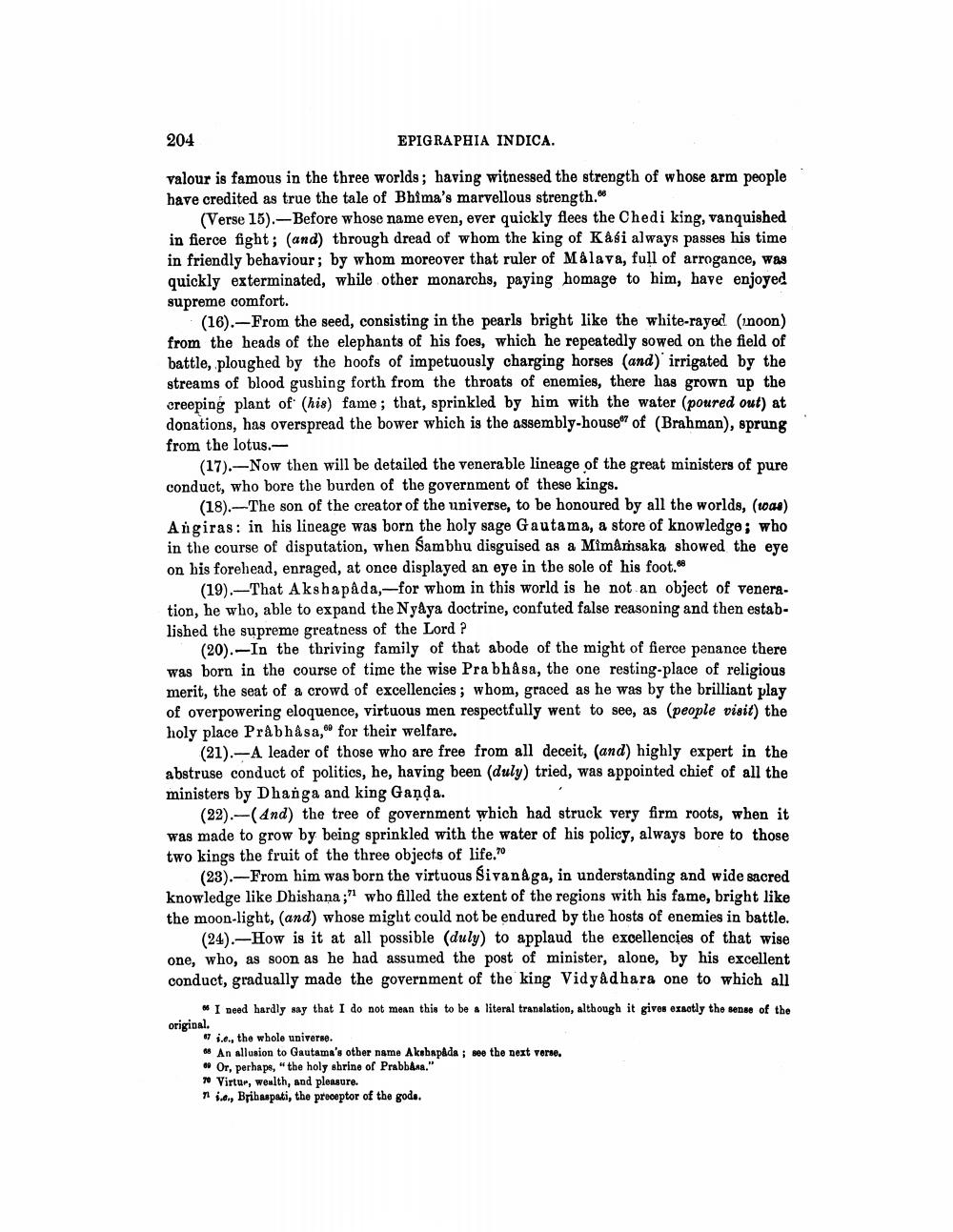________________
204
EPIGRAPHIA INDICA.
valour is famous in the three worlds; having witnessed the strength of whose arm people have credited as true the tale of Bhima's marvellous strength.
(Verse 15).-Before whose name even, ever quickly flees the Chedi king, vanquished in fierce fight; (and) through dread of whom the king of Kasi always passes his time in friendly behaviour; by whom moreover that ruler of Malava, full of arrogance, was quickly exterminated, while other monarchs, paying homage to him, have enjoyed supreme comfort.
(16).- From the seed, consisting in the pearls bright like the white-rayed (inoon) from the heads of the elephants of his foes, which he repeatedly sowed on the field of battle, ploughed by the hoofs of impetuously charging horses (and) irrigated by the streams of blood gushing forth from the throats of enemies, there has grown up the creeping plant of (his) fame; that, sprinkled by him with the water (poured out) at donations, has overspread the bower which is the assembly-house of (Brahman), sprung from the lotus.
(17).--Now then will be detailed the venerable lineage of the great ministers of pure conduct, who bore the burden of the government of these kings.
(18).-The son of the creator of the universe, to be honoured by all the worlds, (1000) Angiras: in his lineage was born the holy sage Gautama, a store of knowledge; who in the course of disputation, when Sambhu disguised as a Mimarnsaka showed the eve on his forehead, enraged, at once displayed an eye in the sole of his foot.
(19).-That Akshapada,- for whom in this world is he not an object of veneration, he who, able to expand the Nyaya doctrine, confuted false reasoning and then established the supreme greatness of the Lord ?
(20).-In the thriving family of that abode of the might of fierce penance there was born in the course of time the wise Prabhåsa, the one resting-place of religious merit, the seat of a crowd of excellencies; whom, graced as he was by the brilliant play of overpowering eloquence, virtuous men respectfully went to see, as (people visit) the holy place Prabhâsa," for their welfare.
(21).- A leader of those who are free from all deceit, (and) highly expert in the abstruse conduct of politics, he, having been (duly) tried, was appointed chief of all the ministers by Dhanga and king Ganda.
(22).-(And) the tree of government which had struck very firm roots, when it was made to grow by being sprinkled with the water of his policy, always bore to those two kings the fruit of the three objects of life.
(23).- From him was born the virtuous Sivanaga, in understanding and wide sacred knowledge like Dhishana;" who filled the extent of the regions with his fame, bright like the moon-light, (and) whose might could not be endured by the hosts of enemies in battle.
(24).-How is it at all possible (duly) to applaud the excellencies of that wise one. who, as soon as he had assumed the post of minister, alone, by his excellent conduct, gradually made the government of the king Vidyadhara one to which all
* I Deed hardly say that I do not mean this to be a literal translation, although it gives exactly the sense of the original.
i.c., the whole universe.
An allusion to Gautama's other name Akabapada ; see the next verse. . Or, perhaps, "the holy shrine of Prabb&ra." ** Virtur, wealth, and pleasure. 11 1.., Brihaspati, the preceptor of the gods.




